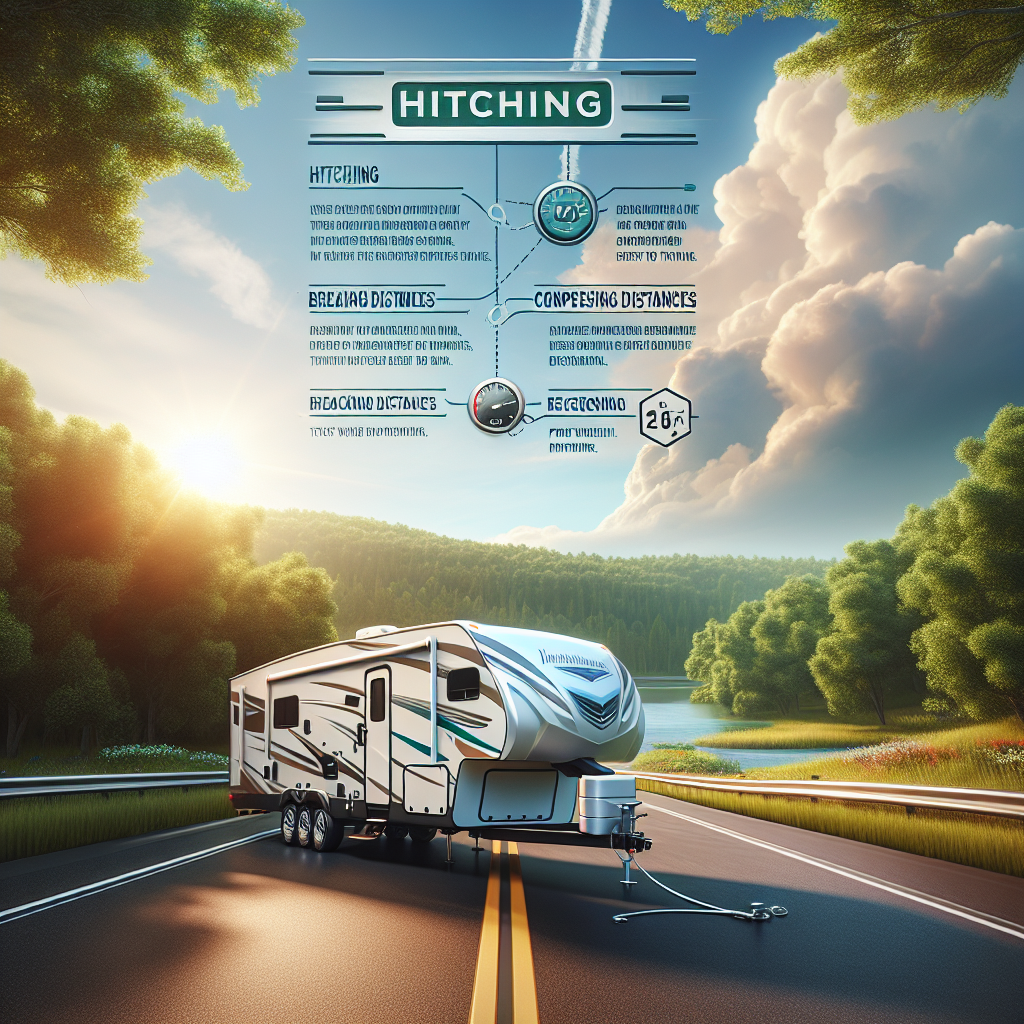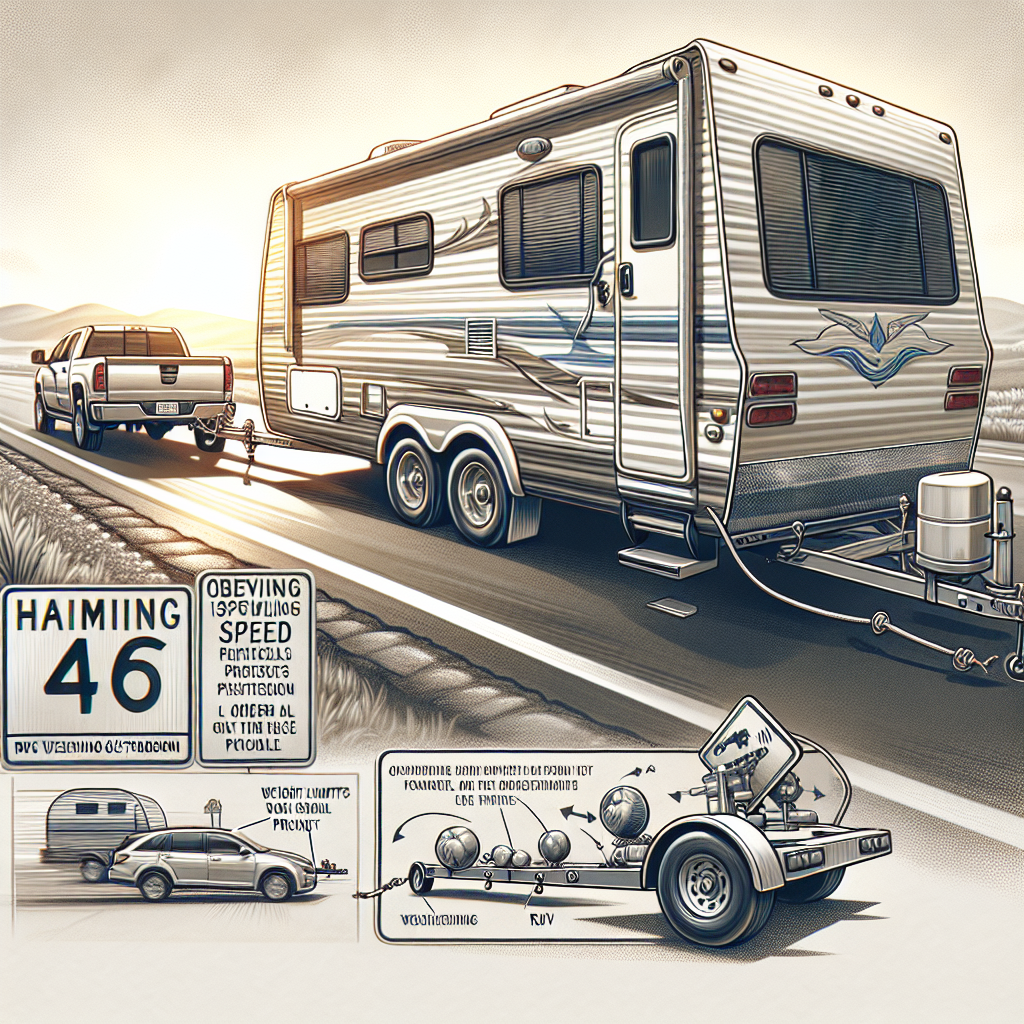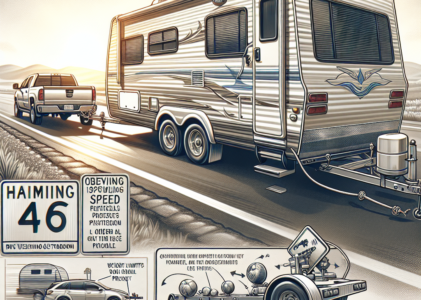Are you planning a road trip in your RV and want to ensure a safe and smooth journey? Look no further! In this article, you will discover 10 essential tips for RV towing and driving safety. Whether you’re a seasoned RV enthusiast or a beginner, these tips will provide valuable insights to help you navigate the road with confidence. So buckle up, adjust your mirrors, and get ready to embark on an unforgettable adventure while keeping safety as your utmost priority.
Understanding RV Towing Basics
RV towing can be an exciting adventure, but it’s essential to have a solid understanding of the basics before hitting the road. The first step is to know your RV’s weight and towing capacity. This information is crucial as it helps you determine if your vehicle is capable of towing your RV safely. Exceeding the recommended towing capacity can put unnecessary strain on your vehicle and compromise safety.
Another important aspect to consider is weight distribution. Uneven weight distribution can lead to instability while towing, making it challenging to control your RV. Make sure to distribute the weight evenly, keeping it within your RV’s limit. Proper weight distribution is key to maintaining control and stability on the road.
Choosing the right trailer hitch is equally important. The hitch connects your RV to your vehicle and plays a vital role in distributing the weight evenly. Ensuring a proper hitch connection is crucial for safe towing. Consider consulting with a professional if you’re unsure about which hitch is suitable for your RV.
Performing Pre-Trip Inspection
Before embarking on any journey, it’s essential to perform a thorough pre-trip inspection. Start by checking the tire pressure and condition of both your vehicle and RV tires. Proper tire pressure is vital for stability and fuel efficiency, so make sure they are inflated to the recommended levels. Additionally, inspect the lights and signals on your RV to ensure they are functioning correctly. Proper lighting is essential for communicating your intentions to other drivers on the road.
Ensure proper hitch connection before starting your journey. Double-check that the hitch is securely fastened, as a loose hitch can lead to dangerous situations on the road. Take the time to inspect all components of the hitch, including safety chains and electrical connections, to ensure everything is in good working order.

Safe RV Loading and Weight Distribution
Properly loading your RV is crucial for both safety and comfort. It’s essential to keep the weight within your RV’s limit to prevent unnecessary strain on your vehicle. Exceeding the weight limit can lead to reduced fuel efficiency, increased stopping distances, and compromised handling. Refer to your RV’s owner’s manual for the recommended weight limit, and make sure to pack accordingly.
In addition to keeping the weight within limits, distributing the weight evenly is equally important. Uneven weight distribution can cause your RV to sway and become difficult to control. Place heavier items towards the center and over the axles, while lighter items can go towards the front and back. Pay attention to the balance and aim for an evenly distributed load.
Don’t forget to secure loose items inside your RV. While traveling, items can shift, potentially causing damage or even accidents. Invest in storage containers, nets, or straps to secure your belongings and minimize the risk of any mishaps.
Maintaining Safe Speed and Distance
Maintaining a safe speed and distance from other vehicles is crucial for RV towing safety. Avoid excessive speeds, as higher speeds can increase the chances of losing control and lead to longer stopping distances. Drive at a speed appropriate for the road and towing conditions, ensuring you have full control over your RV.
Maintaining a safe following distance is equally important. The extra weight and length of your RV will affect your vehicle’s ability to stop quickly. Leave a generous gap between your RV and the vehicle in front of you, providing ample time to react and stop if necessary.
When approaching curves or downgrades, it’s essential to reduce your speed accordingly. The added weight of the RV can cause instability on curves, so take them at a safe speed. Downgrades can also cause your RV to pick up speed quickly, so be prepared to engage your brakes and downshift if needed.

Knowing Your RV’s Height
One aspect of RV towing safety that is often overlooked is knowing the height of your RV. Many accidents occur when drivers forget to account for the height of their RV and encounter low clearance areas such as bridges, overpasses, or tunnels. To avoid such incidents, take the time to measure your RV’s height accurately.
When planning your route, be mindful of low clearance areas. Use resources like maps, travel guides, or RV-specific apps to identify potential height restrictions along your journey. Investing in an RV-specific GPS can also provide valuable information and help you navigate safely.
Handling Wind and Weather Conditions
Wind and weather conditions can significantly impact your RV towing experience. In high winds, it’s crucial to reduce your speed to maintain control. The added height and size of your RV make it more susceptible to wind gusts, which can lead to swaying and instability. Slow down to reduce the risk of accidents and maintain stability on the road.
When encountering strong wind gusts, brace yourself and your RV. Keep a firm grip on the steering wheel and anticipate the gusts by slightly adjusting your steering. Be cautious when passing or being passed by large vehicles, as they can create wind drafts that can affect the stability of your RV.
During severe weather conditions like heavy rain, snow, or ice, it’s advised to pull over if it is safe to do so. Reduced visibility and slippery road conditions can make towing your RV hazardous. Find a safe place to wait out the severe weather until conditions improve.

Utilizing RV Safety Equipment
Investing in RV safety equipment is an excellent way to enhance your towing experience. A weight distribution hitch helps distribute the weight evenly across all axles, improving stability and control. It also reduces the strain on your vehicle and enhances overall towing performance. Consider consulting with a professional to ensure you select the right weight distribution hitch for your RV.
Sway control devices are another valuable piece of safety equipment. They help minimize sway caused by crosswinds, passing vehicles, or uneven road surfaces. These devices increase stability, making your towing experience safer and more comfortable.
Installing a tire pressure monitoring system is highly recommended. This system alerts you to any changes in tire pressure, allowing you to address any issues promptly. Proper tire pressure not only ensures safety but also improves fuel efficiency and extends the lifespan of your tires.
Improving Visibility and Mirrors Usage
Proper visibility is crucial when towing an RV. Start by checking and adjusting your mirrors to eliminate blind spots. Your side mirrors should provide a clear view of the sides and rear of your RV. Take the time to adjust them before you hit the road.
Consider using extended side mirrors to improve visibility further. These mirrors offer a wider range of view and enable you to monitor the entire length of your RV more effectively. Extended side mirrors are an excellent investment that greatly enhances safety and minimizes blind spots.
Backup and rearview cameras are becoming increasingly popular among RV owners. These cameras provide a clear view of what’s behind your RV, making parking and maneuvering much easier. Consider installing these cameras to improve your overall visibility and towing experience.

Practicing Safe RV Backing and Parking
Backing and parking an RV can be challenging, but with practice and some simple tips, it becomes much easier. Always have a spotter to guide you while backing up. Your spotter can keep an eye on obstacles and provide instructions on how to maneuver your RV safely.
Take it slow and steady when backing up. Use small adjustments to avoid sudden movements that can lead to accidents. Avoid rushing the process and take the time to ensure your RV is properly aligned in the parking spot.
Consider using visual and audio aids to assist you when parking. Backup cameras and sensors can provide valuable assistance, alerting you to any obstacles or potential hazards. Utilize these tools to make parking your RV safer and more efficient.
Obtaining RV-Specific Insurance
Having the right insurance coverage for your RV is crucial for peace of mind and financial protection. When selecting an insurance provider, choose one with a solid reputation in the RV industry. Seek recommendations from fellow RV owners or consult online resources to find reputable insurance companies.
Ensure that the insurance policy you choose provides sufficient coverage for your needs. RV-specific insurance typically covers various aspects, including liability, collision, and comprehensive coverage. Be mindful of any limitations or exclusions in the policy and make sure your RV and its contents are adequately protected.
Take the time to thoroughly review the policy details before signing up. Understand the deductibles, coverage limits, and any additional benefits or discounts offered. Being informed about your insurance policy will ensure that you have the necessary protection in any unforeseen circumstances.
With these essential tips in mind, you are well-equipped to embark on your RV towing adventure with confidence. Remember that safety should always be your top priority, and being prepared and informed is key to a smooth and enjoyable journey. Happy towing!



